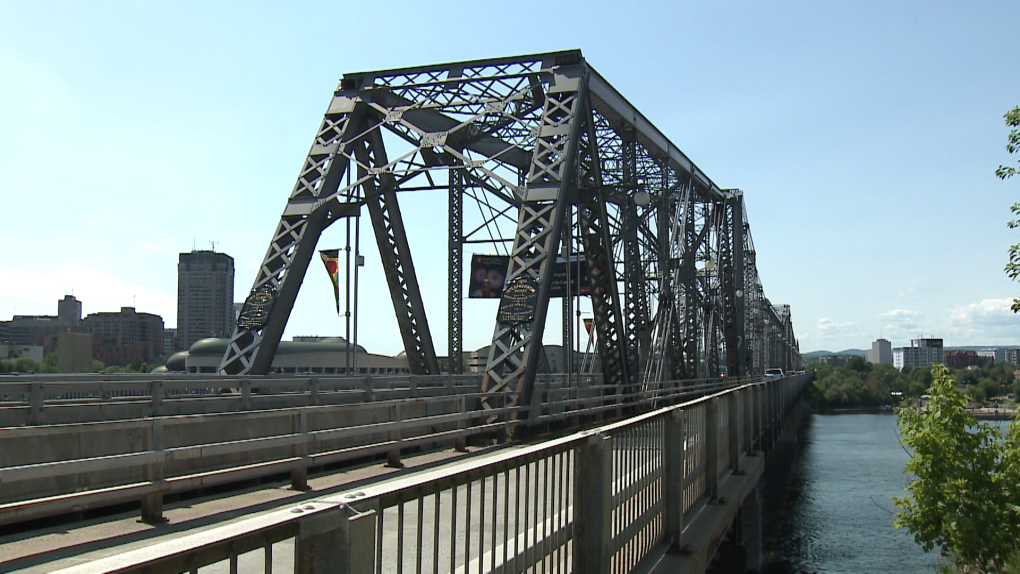Downtown Ottawa will see a 'significant volume' of trucks even if sixth bridge is built, NCC report says
 The Alexandra Bridge connects Ottawa and Gatineau over the Ottawa River.
The Alexandra Bridge connects Ottawa and Gatineau over the Ottawa River.
As the National Capital Commission launches new public consultations on future interprovincial crossings between Ottawa and Gatineau, a draft report concludes a sixth bridge over the Ottawa River would not drive significant truck traffic out of the downtown core.
The NCC is looking at building a new interprovincial bridge connecting Ottawa and Gatineau as part of the Long-Term Integrated Interprovincial Crossings Plan. Several of the five current crossings are expected to reach capacity by 2031.
According to the draft plan published to the NCC's website this week, a new bridge will not alleviate truck traffic in the downtown core.
"Building a new crossing would divert some heavy truck demand," said the report. "However, there would still be a significant volume of heavy trucks in the core."
The report from IBI Group for the NCC says based on current projections, a new interprovincial crossing in the east end would divert 15 per cent of heavy truck traffic downtown by 2050, while a new crossing in the west end would reduce truck traffic downtown by eight per cent.
"To achieve greater reductions and better manage goods movement, more measures will be required," said the report. "For example, changes in logistics practices or in truck routes."
The study did find that a traffic tunnel would reduce interprovincial heavy truck volumes in the core by approximately 33 per cent by 2050. However, the study notes it would not provide alternative routes for truck travel across the Ottawa River, "further increasing the reliance of goods movement on the Macdonald-Cartier Bridge."
More than 51,000 trips were made every morning rush hour between Ottawa and Gatineau on the five interprovincial bridges before the start of the pandemic. The draft plan notes traffic capacity "is approached or exceeded" on all five crossings in the morning rush hour period.
Morning rush hour congestion is expected to grow by 53 per cent on interprovincial bridges between 2011 and 2050, even with transit improvements and assumed increases in work-from-home levels following the COVID-19 pandemic.
The NCC has been looking at possibly building a sixth interprovincial crossing over the Ottawa River for decades, most recently located near Kettle Island in Ottawa's east end.
Mayor Jim Watson reiterated on Wednesday he is opposed to a sixth crossing between Ottawa and Gatineau.
"There's opposition to another bridge, especially in the Kettle Island. There's not a lot of support for another bridge – either here or in the province," said Watson in French.
"I will continue with this opposition."
The report does say more roads and bridges will not be enough to deal with congestion and travel times as the population grows.
"It is important to recognize that accommodating growth in travel demand solely through building more vehicular lanes will only lead to further congestion," said the report. "Transit, walking and cycling would be more attractive if they provide more reliable and time-competitive travel options."
PUBLIC CONSULTATIONS
The NCC launched public consultations this week on the draft plan for its long-term integrated interprovincial crossing plan for the capital region.
The NCC says the plan sets a blueprint for collaboration with partnering agencies to establish a shared long-term vision and strategies for interprovincial transport of people and goods in the region. It will include short-term strategies, medium term strategies for shifting interprovincial travel behaviour and long-term strategies.
For more information, visit ncc-ccn.gc.ca.
The NCC plan acknowledges the COVID-19 pandemic has resulted in an accelerated shift to remote working, but the long-term impact is still unknown.
The final draft plan will be presented to the NCC's Board of Directors in January.
CTVNews.ca Top Stories

Bird flu, measles top 2025 concerns for Canada's chief public health officer
As we enter 2025, Dr. Theresa Tam has her eye on H5N1 bird flu, an emerging virus that had its first human case in Canada this year.
DEVELOPING Body found in wheel well of plane at Maui airport
A person was found dead in the wheel well of a United Airlines flight to Maui on Tuesday.
Raised in Sask. after his family fled Hungary, this man spent decades spying on communists for the RCMP
As a Communist Party member in Calgary in the early 1940s, Frank Hadesbeck performed clerical work at the party office, printed leaflets and sold books.
Police identify victim of Christmas Day homicide in Hintonburg, charge suspect
The Ottawa Police Service says the victim who has been killed on Christmas Day in Hintonburg has been identified.
Christmas shooting at Phoenix airport leaves 3 people wounded
Police are investigating a Christmas shooting at Sky Harbor Airport in Phoenix that left three people injured by gunfire.
Ship remains stalled on St-Lawrence River north of Montreal
A ship that lost power on the St. Lawrence River on Christmas Eve, remains stationary north of Montreal.
Your kid is spending too much time on their phone. Here's what to do about it
Wondering what your teen is up to when you're not around? They are likely on YouTube, TikTok, Instagram or Snapchat, according to a new report.
Bird flu kills more than half the big cats at a Washington sanctuary
Bird flu has been on the rise in Washington state and one sanctuary was hit hard: 20 big cats – more than half of the facility’s population – died over the course of weeks.
6,000 inmates stage Christmas Day escape from high-security Mozambique prison
At least 6,000 inmates escaped from a high-security prison in Mozambique's capital on Christmas Day after a rebellion, the country's police chief said, as widespread post-election riots and violence continue to engulf the country.































